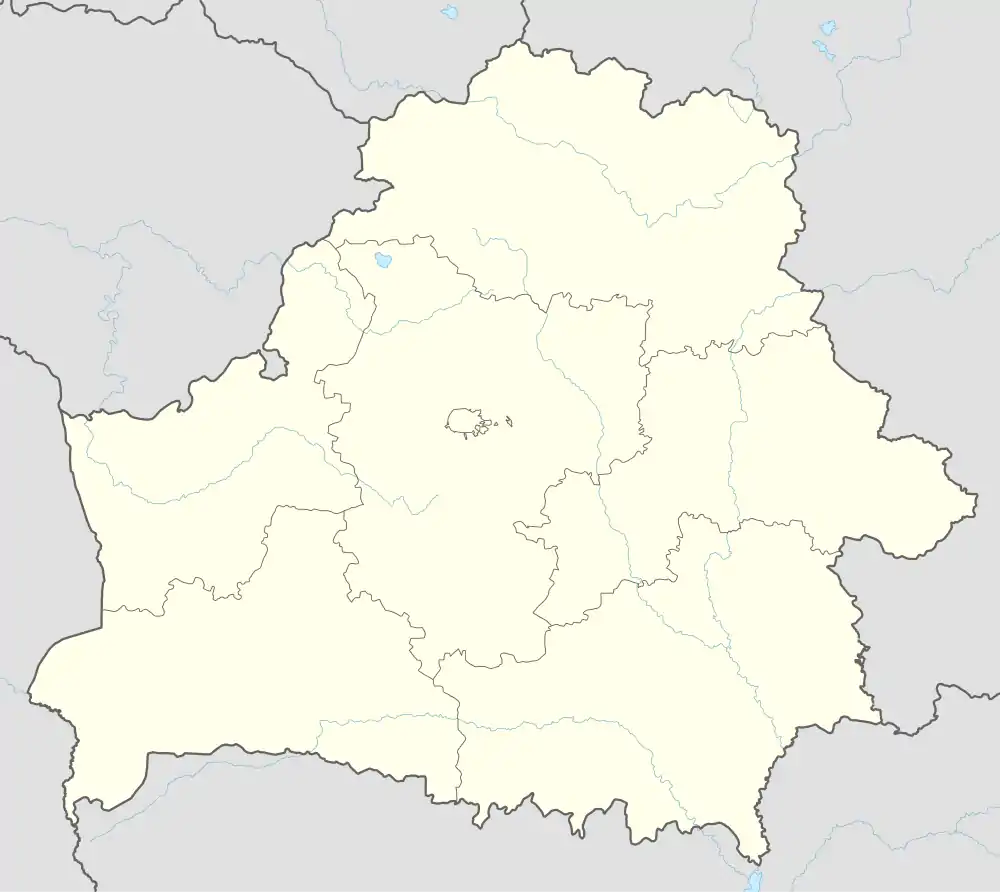Luninyets
| |
|---|---|
.jpg.webp) | |
 Flag  Coat of arms | |
 Luninyets | |
| Coordinates: 52°15′N 26°48′E / 52.250°N 26.800°E | |
| Country | Belarus |
| Region | Brest Region |
| District | Luninyets District |
| First mentioned | 1449 |
| Area | |
| • Total | 18.1 km2 (7.0 sq mi) |
| Population (2023)[1] | |
| • Total | 23,548 |
| • Density | 1,300/km2 (3,400/sq mi) |
| Time zone | UTC+3 (MSK) |
| Postal code | 225642-225644 |
| Area code | +375 1647 |
| License plate | 1 |
| Website | Official website (in Russian) |
Luninyets or Luninets (Belarusian: Лунінец, romanized: Luniniec; Russian: Лунинец;[2] Polish: Łuniniec; Lithuanian: Luninecas; Yiddish: לונינייץ, romanized: Luninitz) is a town in Brest Region, Belarus. It serves as the administrative center of Luninyets District.[1] As of 2023, it has a population of 23,548.[1] It is home to Luninets air base.
History
.jpg.webp)
Luninyets is said to be mentioned in print sources dating to 1540. Within the Grand Duchy of Lithuania, it was part of Nowogródek Voivodeship. In 1793, the town was acquired by the Russian Empire in the course of the Second Partition of Poland. In 1888, while under Russian sovereignty, a railway junction was built in Luninyets, linking it by rail to Warsaw, Rivne, Vilna and Gomel, and a proper railroad station was added in 1905. Łuniniec became part of the Second Polish Republic in 1921 following the Polish-Soviet War. It was a county seat within the Polesie Voivodeship.
| Year | Pop. | ±% |
|---|---|---|
| 1921 | 8,267 | — |
| 1931 | 8,715 | +5.4% |
| 2023 | 23,548 | +170.2% |
| Source: [3] | ||
Following the joint German-Soviet invasion of Poland, which started World War II in September 1939, Łuniniec was occupied by the Red Army and, on 14 November 1939, incorporated into the Byelorussian SSR. Luninyets was occupied by Nazi Germany from 10 July 1941 until 10 July 1944 and administered as a part of the Generalbezirk Wolhynien und Podolien of Reichskommissariat Ukraine. After 1944, Luninyets remained part of the Soviet Union until 1991, at which time it became part of the newly independent Republic of Belarus.
The Jewish population was important in the town.[4] From 1941 to 1943, 4,000 Jews were murdered in mass executions perpetrated by an Einsatzgruppe.[5][6]
Education
In Luninyets there are 2 vocational colleges - polytechnic and agricultural production.[7]
Transport
In the beginning of 20th century, Luninyets became an important railway junction. In 1884–1886, train traffic was opened to Gomel, Rovno, Vilna and Brest, a large railway junction with a depot, workshops and other buildings was built near the village, a railway station was built.
References
- 1 2 3 "Численность населения на 1 января 2023 г. и среднегодовая численность населения за 2022 год по Республике Беларусь в разрезе областей, районов, городов, поселков городского типа". belsat.gov.by. Archived from the original on 17 April 2023. Retrieved 13 August 2023.
- ↑ D.E. Rosental, Slovar' udarenii dlya rabotnikov radio i televideniya (Moscow, 1984), p. 640.
- ↑ Wiadomości Statystyczne Głównego Urzędu Statystycznego (in Polish). Vol. X. Warszawa: Główny Urząd Statystyczny. 1932. p. 194.
- ↑ "History - Jewish community before 1989 - Łuniniec - Virtual Shtetl". Archived from the original on 2016-06-04. Retrieved 2016-05-12.
- ↑ "AfterMarket.pl :: Domain moreshet.pl".
- ↑ "המכון הבין-לאומי לחקר השואה - יד ושם".
- ↑ "Перечень учреждений образования, реализующих образовательные программысреднего специального образования (УССО)".
External links
- Site of Belarus city Luninets
- Extensive resource on Jewish Luninets
- Photos on Radzima.org
- Photo and video Luninets
- Luninyets, Belarus at JewishGen
